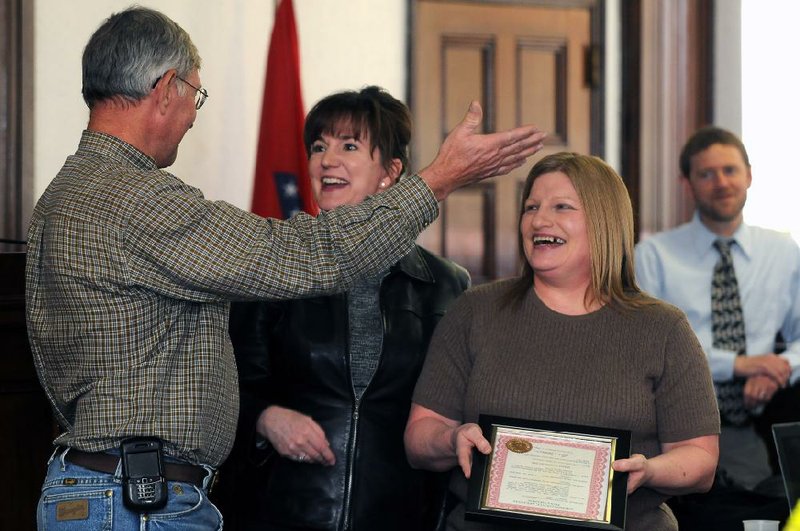Madison County’s first full-time juvenile probation officer believes all children have potential, she said.
“I feel that if they can’t sense that you truly care about them, why would they be willing to do better?” said Donna Goodnight, who retired at the end of March after more than 13 years as the county’s first and only juvenile probation officer. “You want to do what you can to help them. They’re a good person. They’re just making bad choices. They can change and still have a productive life.”
Goodnight, 48, began her duties under Judge Stacey Zimmerman on June 1, 1999. She made an office for herself in a building across from the Madison County Courthouse that primarily is used for storage. The adult probation office also is in that building.
Juvenile probation officers track youthful offenders after they are sentenced. Probation officers report probation violations to prosecutors, and provide aid and counsel to youthful offenders and their families as required by court order. The officers also report child abuse.
As part of her duties, Goodnight also looked after youths referred to the court system for truancy or family problems.
Building relationships with children is essential in the juvenile court system, especially when troubled children have experienced abuse, Goodnight said.
“A lot of it is them having someone to talk to and someone who really cares about them,” Goodnight said. “They’re so hurt that they don’t care about themselves. They break the law. They put themselves at risk.”
Goodnight said she told her charges that they could change their lives. Some of the offenders she worked with as young teenagers would return to show her the improvements they made.
“You get attached to them,” she said.
Goodnight’s replacement is Niki Rowland, who spent five years as a school resource officer for the Madison County sheriff’s office.
“You can’t replace Donna Goodnight,” Rowland said. “I just hope I can keep up what she started. She truly cared for the kids of Madison County.” STARTING OUT
Madison County did not have a full-time juvenile probation officer when Zimmerman was elected in 1998, Zimmerman said. Instead, a Washington County juvenile probation officer would go to Madison County once a month. Both counties are part of the 4th Judicial District.
Zimmerman, who began serving as judge over youthful-offender cases in 1999, sought approval from the Madison County Quorum Court to hire a full-time juvenile probation officer for the county, providing the county with someone to work with children and teenagers under court supervision five days a week. Having a full-time juvenile probation officer in Huntsville also provided a resource for parents.
“It’s pretty much being in contact with the schools, making sure the parents can call the probation officer when there are problems, making sure kids are on the right track,” Zimmerman said. “It has really helped.”
Juvenile probation officers work in most counties in Arkansas. State law requires the state’s 23 judicial districts to have at least one certified juvenile probation officer. The state and counties share the cost of the probation officers’ salaries.
Goodnight earned $31,803.20 in 2011, with the state providing $15,000 to Madison County, according to information from the state auditor’s office.
Goodnight spent time going to schools in Huntsville, Kingston and Saint Paul to check on children and teenagers under court supervision, Zimmerman said. Families could meet with her close to home. In some cases, Goodnight advised parents to seek the help of a counselor, preventing some situations from requiring intervention by the juvenile court.
Before Madison County had a full-time juvenile probation officer, Billy Allred, deputy prosecutor for Madison County, had a hard time knowing whether children and teenagers were abiding by the judge’s orders, he said. He depended on Goodnight to ensure that adolescents followed orders and to report violations, such as breaking off ankle monitors or failing drug screens, he said.
Allred prosecutes juvenile delinquency cases for crimes involving alcohol, drugs, theft or criminal mischief, he said. Youths under Goodnight’s supervision respected her, he said. She not only reported violations, but also would let Allred and the judge know when those under her watch were doing well.
“Most of them she knew personally,” Allred said. “They thought she was fair.” A DIFFERENT PATH
Kingston Public School has one or two students a year under the supervision of the juvenile court, Principal Marsha Shaver said. The school of about 250 students in kindergarten through 12th grade is part of the Jasper School District.
When she went to Kingston, Goodnight would check the grades and attendance of students under her supervision. She would administer drug tests as mandated by the judge and meet with the students at school so they didn’t have to miss a school day, Shaver said.
“They knew they had to walk the line and straighten up,” Shaver said.
The juvenile justice system provides children with another chance to choose a different path, Goodnight said.
“The majority of them follow what they’re supposed to do,” she said. “You’re still going to have one or two that are going to push the limit.”
Even when the teenagers would rather be anywhere else than meeting with her, she hoped she was able to help them, Goodnight said.
Goodnight took an early retirement because of health problems. Her husband of 21 years is disabled.
“I wish I was able to stay and continue doing it,” she said. “I sure am going to miss all of the families that I work with and the kids. You just have a bond with some of the kids.”
Northwest Arkansas, Pages 7 on 04/04/2013

